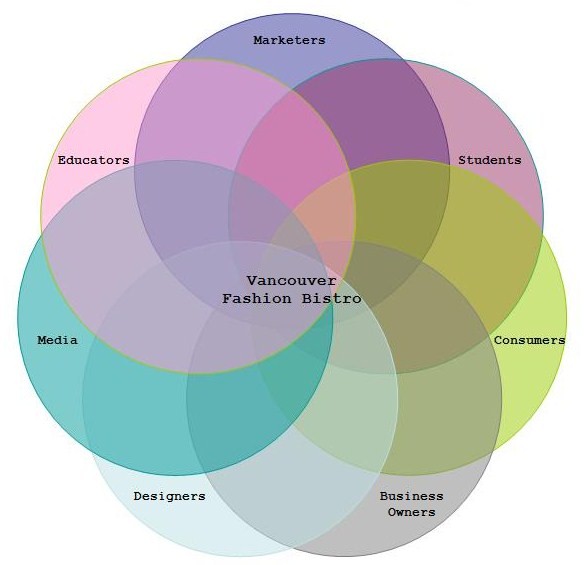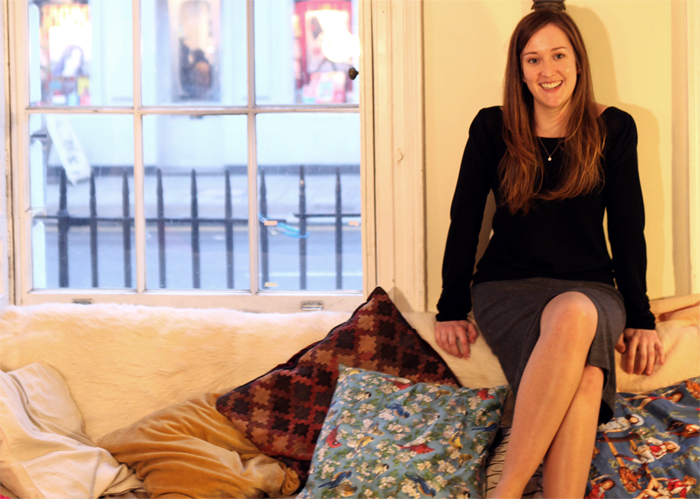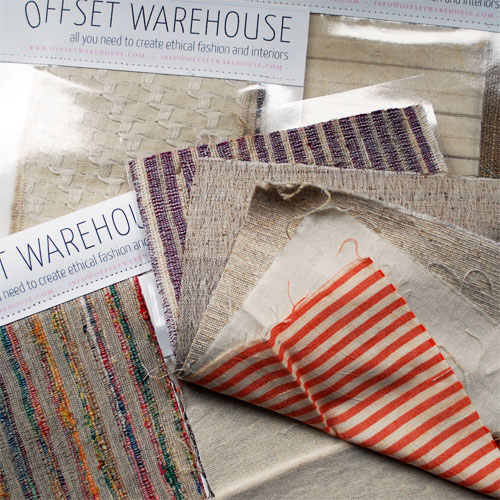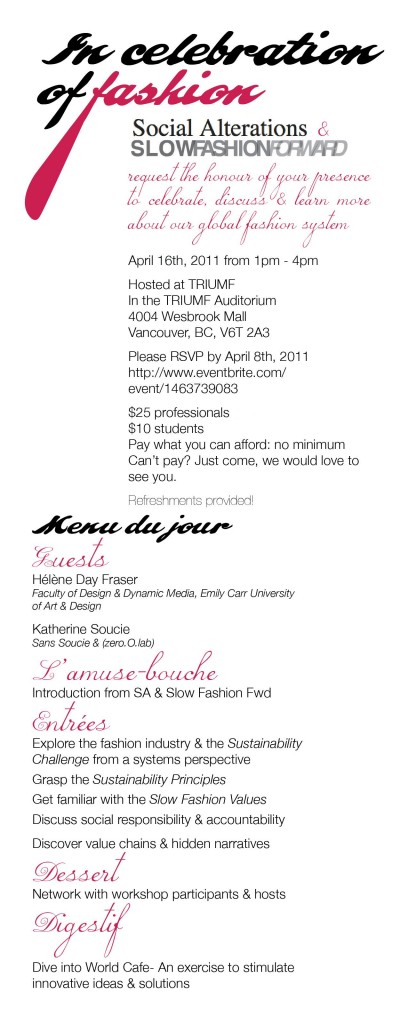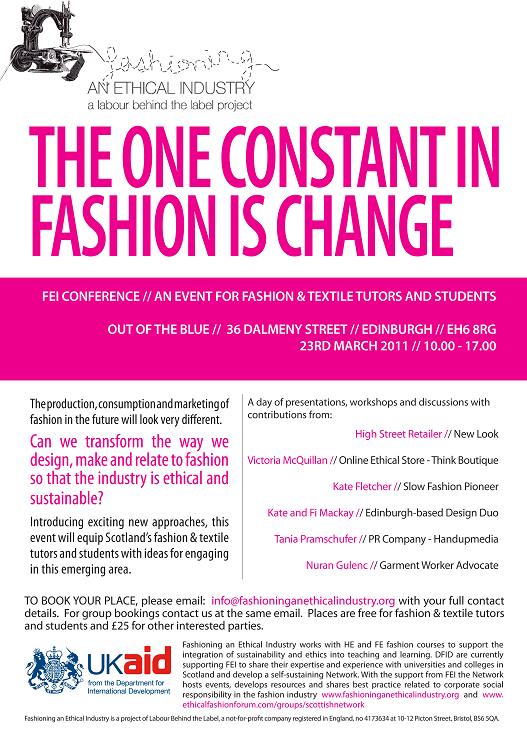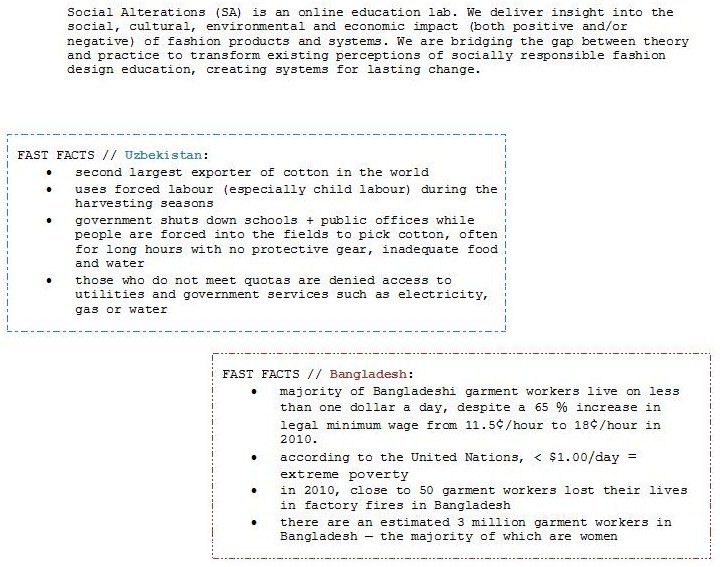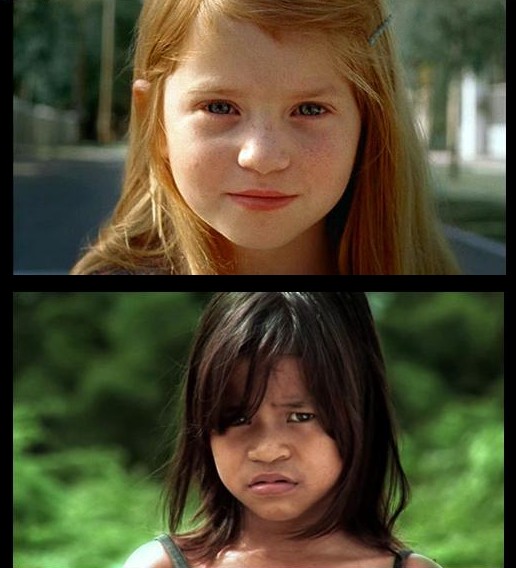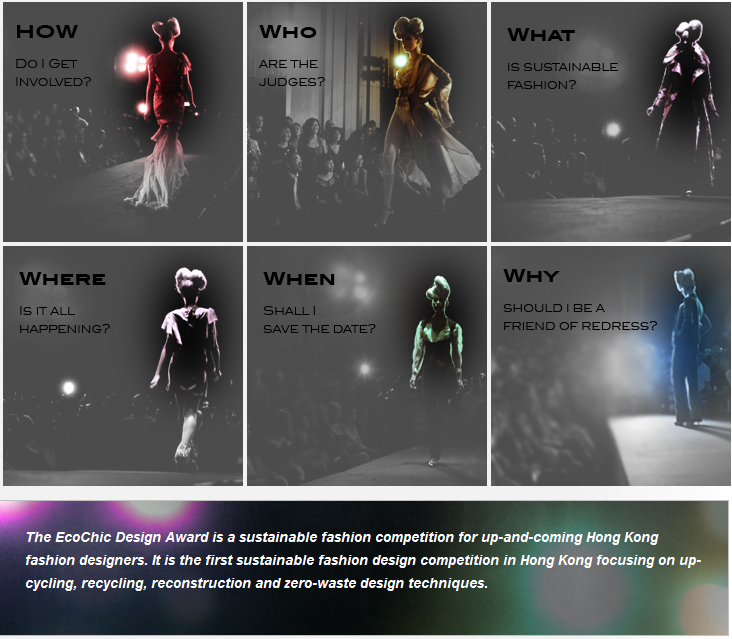In Celebration of Fashion // Fashion Bistro from Social Alterations on Vimeo.
On April 16th, fashion marketers, students, educators, consumers, business owners, designers and media attended Vancouver’s Fashion Bistro, presented by Social Alterations and Slow Fashion Forward, in celebration of fashion. The four-hour interactive workshop focused on sustainability challenges and principles, slow fashion values, hidden narratives, value chains, transparency and accountability.
We’d like to thank our special guests, Hélène Day Fraser, Faculty of Design & Dynamic Media, Emily Carr University of Art & Design and Katherine Soucie Sans Soucie & (zero.O.lab). We’d also like to thank TRIUMF for graciously donating their auditorium for this special event.
The Vancouver event was the first held in a workshop series, with upcoming workshops in Barcelona, Chicago and London. Once the other cities have closed, we will share outcomes from the events, cross-pollinate ideas and present a report.
The workshop closed with a World Café visioning exercises. Participants were divided into groups and had lively conversations around one key question:
In the year 2025, what does a sustainable and socially responsible fashion industry look like?
To build a sustainable and socially responsible fashion industry in Vancouver, we need both a vision of where we want to be in the future and a plan for getting there. The World Cafe exercise was one step in this process as participants co-created a shared vision. Participants were asked to let go of any current barriers or assumptions about the future, and to brainstorm creative and thoughtful ideas for what a sustainable and socially responsible industry looks like.
Here is a raw account of just some of the conversations that took place in Vancouver.
Table 1
The New Consumer:
-asks questions and utilizes consumer reviews to normalize responsible fashion
-an increased demand for sustainable & responsible fashion
-government and industry leaders are encouraging (consumers) to change behaviour
Responsibility:
-informed consumers
-informed communities
-informed dialogue
Local:
-community & education
-relationship building and teamwork
-economies & job creation
-garment production
-sourcing raw materials locally (desire for fibre rotation systems, materials that preserve biodiversity)
Sharing:
-basics (sharing basic wearable items)
-’pants on demand’ – moving away from mass production and placing garment orders only when a customer demands a new item
-new/innovative technologies – for example Air Dye
Table 2
Sustainable and socially responsible fashion industry will have:
-faith
-small clothing cooperatives
-small cooperative development
-traditional practices
-open design – collective design
-design as social and environmental action
-clothing lines designed to decompose
-wearables
-language
-local presence – political and environmental
-conversations
-garment makers provoke new ways of living
-SustainABLE
In 2025 there will be more:
-recycling and education
-transparency in business
-responsible us of social media
Use of Hactivism – will have revised the sustainABLE and social responsible industry
Table 3
2025 will see ideas in action:
-continuous understanding of social and environmental issues
-continuous growing and continuous learning
-both top down and bottom up approach is used to create a sustainable industry
-responsible media and marketing
-communication – through social media there will be transparent communication within the industry and to consumers
-life cycle analysis = core
Table 4
| Now | 2025 |
| No trust -reactive stance towards responsibility -transparency is still “new” -values and modes of production in question -There is a need for: -skill development -education -dialogue -sharing resources -knowledge transfer – consumers have low to no garment making skills |
Trust -proactive stance within the industry -social and environmental transparency is the norm -quality vs. quantity -people love their garments -people are skilled and knowledgeable in creating their clothing -bartering and skill trading -royalties on brand names/designer clothing, similar to the music industry – second hand sales, royalties are given to -sales people are knowledgeable about clothing production and process and can share that info when you are in the store -clear government support for local/sustainable fashion -there will be significantly less choice in new materials, companies/designers will HAVE to use more sustainable materials -rebuilding community through fashion -developed skills -from consumerism to creative culture -skill sharing -participation -customization -responsible governance |
